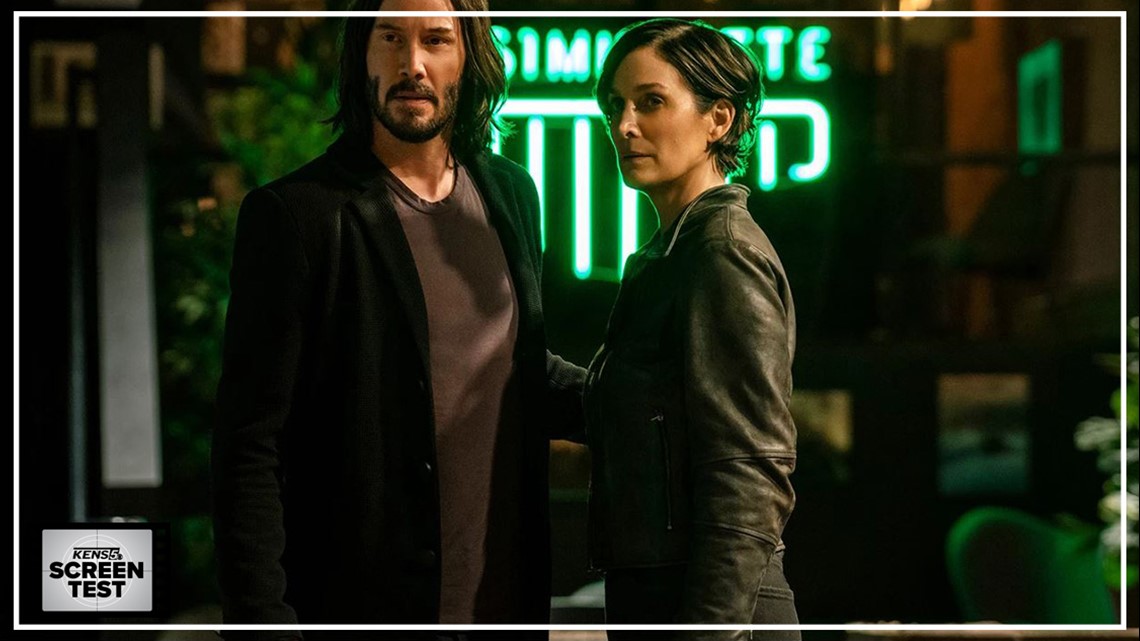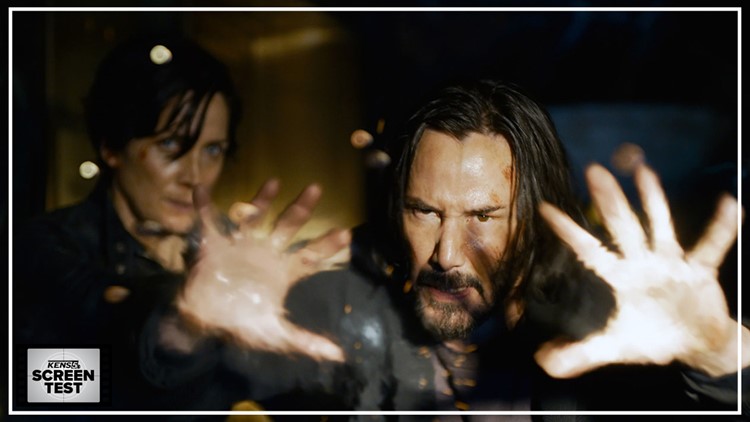Did you hear those cheers from Spider-Man devotees while driving past your multiplex last weekend? It’s possible a bigger magnitude will register on the pop culture Richter Scale Wednesday when green-tinted code streams down cinema screens for the first time in 18 years, a familiar musical swell beckoning audiences back down the rabbit hole.
It’s true that there’s considerable power in experiencing the elegant aesthetic motifs of “The Matrix” in 2021, and in the same theaters where Marvel has spent the last decade bluepilling an entire scale of blockbuster filmmaking. From both the perspective of the movies and the perspective of the reason we escape to the movies, Lana Wachowski’s “The Matrix Resurrections” couldn’t have arrived at a more appropriate time; a diminishing number of storytellers are granted the resources to make their zaniest ideas reality, while the real-world volatility of recent years makes the hypothetical that we’re living in a simulation gone haywire all the more relevant (even if just as coping mechanism). To be presented with the choice to free ourselves is what fuels “The Matrix’s” legacy, which makes it all the more meaningful that Wachowski builds “The Matrix Resurrections” on a philosophical reversal by centering what it means to be the one presenting the choice.
The difference separating the two roles is where Wachowski’s movie – the first in the series spearheaded by Lana sans her sister, Lilly – is at its most confident and self-reflexive. Expect to be caught off guard by the first sequence, a deja vu-inflected ignition point which does everything but definitively answer whether “The Matrix Resurrections” is more a reboot or a sequel.
Instead, that question steers the invigorating feeling of detachment from expectation that sprouts when we see a version of the original film’s opening nighttime chase played out in…well, a different skin, to put it bluntly. “Why use old code to make something new?” asks Jessica Henwick’s blue-haired newcomer, the matrix-liberated Bugs; that her inquiry is the thesis to this funny, unexpected, deeply sincere, deeply defiant movie and also the question which torments Keanu Reeves’s messianic Neo as we reunite with him goes to show Wachowski’s narrative playfulness has only grown in its resolve.
To wit: “The Matrix Resurrections” is a storytelling Russian doll, the original trilogy’s events ingrained deep enough into the cultural infrastructure of a sunny, seemingly idyllic city to make one skeptical about whether what we’re seeing is the truth. Leave it to Wachowski to briefly place us in the anxious mindset of her protagonist, now sporting a shaggy mane, taking prescriptions of blue pills and increasingly finding his sense of reality crumbling under the weight of a fiction he knows well, just not in the way he thinks he knows it. “The Matrix Resurrections” makes use of nostalgia but refrains from banking on it, instead weaving in split-second strands of fleeting images from the previous movies to drive home two salient points: It’s been a hell of a long time in our real world, and it’s been a hell of a long time in the world of Neo and Carrie-Anne Moss’s Trinity….or, as we meet them here, Thomas Anderson and Tiffany.
To provide more specifics about where Wachowski’s movie begins would be to risk providing clarity. I’ll refrain from doing so here, because it’s precisely the lack of clarity which makes this opening act daring and unpredictable, less a table-setter than an attempt to whip the cloth of reality out from under us. Environmental details like the Simulatte coffee shop and a media company called Deus Ex Machina are equally cheeky and meaningful, Easter eggs and neon guideposts to Wachowski’s anti-consumerist angles. All the while, there’s a thrilling touch of cinematic vertigo to the way the first act echoes familiar beats, lines and ultimatums, as well as a sly ingeniousness to where she chooses to deviate.
More than a structurally audacious blockbuster, however, this is a timely one. The screenplay (co-written by Aleksandar Hemon and David Mitchell) seasons its hyperimmediate themes of brand recycling and cultural compression with a causticity and sharpness of metatextuality that makes you wonder, a) How did Warner Brothers sign off on some of these choices? and, b) Lana Wachowski is never going to make a Marvel movie, huh?
No, she probably won’t. But in watching Neo escape from having been held captive by the very narratives defining him, you get the sense she’s never been more at peace with that. Sony and Disney get their Spider-Man souffle, Wachowski gets her artistic reckoning. By the time one character declares that “nothing comforts anxiety like nostalgia,” she’s more than earned the line, staring down the massive burden of her own legacy with a mischievously raised eyebrow while other franchise resurrections buckled under the expectations they shoulder.
We see familiar faces return, but only sort of, and a few of these reunions accomplish little more than emphasizing how much time has passed in this world (an epiphany that doesn’t bite as much as it would like to). More to the point, there are familiar roles which need filling, and it’s uncanny watching reputable actors like Jonathan Groff (thoroughly excellent), Neil Patrick Harris (appropriately didactic) and Yahya Abdul-Mateen II (lively and dynamic) in certain archetypal shoes once we remember that the story of “The Matrix” is – like the matrix itself – one about passive performance, our willingness to wear disbelief on our sleeve.
Whether or not audiences brought that willingness is something that defined the 1999 movie’s divisive sequels. It’s likely to be the case with “Resurrections” too. The pacing stalls when we’re getting caught up on the story and intriguing twists on landmark concepts are explained by someone bent on talking their opponent to death. For every gorgeously rendered frame there’s a bout of unwieldy exposition, for every trailer-required delivery of cataclysmic stakes a touch of the cleverness that always made these movies most enthralling when they were at their most intimate.
And that’s what’s key about the big, audacious swing that is “The Matrix Resurrections”: It’s nothing if not the franchise at its most intimate, placing newfound emphasis on Neo, Trinity and the degrees of reality separating them at this point in the saga. Without giving away too much, the two act like they’ve never met when brushing shoulders early on at Simulatte, a meet-cute that defies the franchise’s dystopian foundations. If our familiarity with characters whose passion for each other was meaningfully suggested but never fully foregrounded before charges the moment with a certain melancholy, it’s the pair of poignant and endearing performances from the actors playing them that elevates it to something operatic and tragic.


That tone comes to drive the rest of “Resurrections,” holding fast in Wachowski’s ambitions as the second act briefly cedes ground to more familiar worldbuilding elements. We never quite know how we’ll react to a bit of deja vu, and that goes for the movies too, including “The Matrix Resurrections,” which leans toward the “Force Awakens” model in spots whereas its stellar opening sequences rejected it. That this is a movie which ushers us to a newfound sanctuary for humanity as conflict with the machines rears its head once again only makes it impressive that it’s ultimately emotions which dictate the plot’s direction.
Entrenched desires for reconnection aren’t often the vehicle by which our tentpoles arrive at more traditional definitions of spectacle these days. Yet for as bold as “The Matrix Resurrections” is in its meta-narrative approach to folding in one of the defining sci-fi stories of the last 30 years, what it’s ultimately revealed to be is an epilogue paring the mind-melting grandiosity of that trilogy down to an “Inception”-esque heist movie fully plugged into its biggest throwback element: good old-fashioned human yearning. The hardware is the reason this movie is set to hit IMAX (and potentially result in a brief surge in sales of black floor-length jackets), but it’s the software of Wachowski’s personal screenplay that gives it soul.
Which isn’t to say it lacks for things that go boom. Stuff blows up early and often in “The Matrix Resurrections” – among them cars, trains and buildings – though it isn’t until a sleekly directed denouement that Wachowski the visual-thrills aficionado fully reappears. Things culminate with a collision of the delirious and dramatic; the chaos of a zombie flick invading a shameless scifi romance with such fever-pitch excitement that it should serve as suitable antidote for anyone who snoozed during the last scenes of “Dune.” That the maximalism becomes nearly comical as an entire city quite literally plunges to quash an escape is very much part of the point Wachowski is making about the priorities of our dead-eyed monoculture, namely that it’s arrived at a point where there aren’t many options besides surrender or ostracization.
Our heroes flicker between waves of enemies like distorted phantoms in the movie’s most jaw-droppingly creative bit of action-movie virtuosity. But the effect also comes across as something primal—an appropriately visceral touch to match the alarm-clock tenor by with Wachowski directs the bookending acts of her deliciously furious “Resurrections.” Perhaps the climactic urban showdown serves as a course-correction for a similar-looking but lethargic battle which saw “Matrix Revolutions” swallowed up in a void oddly absent of stakes. Wachowski triumphantly does the opposite here, keeping her two avatars for genuine affection centered in a place (and moviemaking space) that’s just fine coasting by without it. Love is still the strongest force in the world, whether that world is a simulated one or not.
"The Matrix Resurrections" is rated R for violence and some language. It releases Wednesday in theaters as well as on HBO Max for a limited time.
Starring: Keanu Reeves, Carrie-Anne Moss, Yahya Abdul-Mateen II, Jonathan Groff
Directed by Lana Wachowski
2021
--
MORE REVIEWS:
- 'The Power of the Dog' Review: The Western's reassessment continues with Jane Campion's sensational new drama
- 'Encanto' Review: Disney's newest takes a colorfully Colombian lens to intergenerational anxiety
- ‘King Richard’ Review: Will Smith-led tennis drama holds serve against sports-movie conventions
- ‘Procession’ Review: Strangers find salvation through art in new Netflix documentary
- ‘Belfast’ Review: Kenneth Branagh takes a black-and-white trip down memory lane
- ‘Eternals’ Review: The MCU’s future collides with MCU formula in conflicted cosmic skirmish



